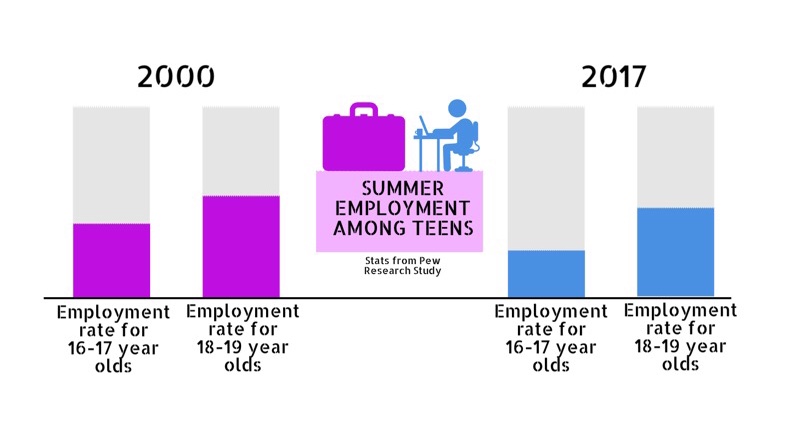Why I want to get a job this summer—and you should too
December 19, 2017
Although summer is still a long six months away, application deadlines for many summer internships and programs are coming up fast, so I’ve found myself thinking a lot about what to do next summer. For me, the decision has been difficult.
As I approach senior year, there’s a lot of pressure to spend summers building up a résumé for college applications. Most people I know assume that getting an internship or completing a summer program is the best option because it’s a way to “showcase your passions,” commonly considered a vital aspect of a successful college application.
But the more people I talk to and the more research I do, the more I feel that regular jobs—like working at a grocery store or restaurant or even babysitting—deserve a lot more respect than they’re getting. While activities like internships have particular benefits or attractions, we shouldn’t discount summer jobs as an eminently worthwhile way to spend a summer.
The decline of teen summer jobs is well-documented. Whereas the majority of teens had summer employment in the ‘70s, ‘80s, and ‘90s, fewer than a third do now, according to a 2015 Pew Research study. For 16- and 17-year-olds, the summer employment rate is now only 20 percent.
This decline in employment is unfortunate because “normal” jobs have unique benefits. For starters, working those jobs is the only way to get true experience in the working world. While internships can yield valuable insight into career paths, they often fall short in other areas. Jobs are more likely to require employees to deal with unpleasant customers or bosses, which builds social skills and teaches employees to stand up for themselves. Jobs also tend to demand more responsibility, since pay depends on performance. As such, students with jobs are more likely to fully develop skills like time management and work ethic.
As a result of these factors, a 2012 Drexel University study found that teens who worked at a formal job over the summer had a 20 to 25 percent higher salary than their nonworking counterparts a decade later. As one of those nonworking counterparts, I can understand these results. I had an internship at the broadcasting agency Voice of America last summer, and I learned a lot. But what I learned was mostly through observation—I observed how professional journalists conducted interviews, how a newsroom works and how a live TV show is produced. What I couldn’t learn from observation was the aforementioned skills that come through the experience of having a job.
Despite what many believe, colleges are well aware of these benefits. Bruce Poch, former dean of admissions at Pomona College, lamented the “complete disappearance of summer jobs” among upper-income students (like many at Whitman) who are increasingly turning to internships. The admissions officers know that many of these internships are solely “decorative,” he said in an interview with Quartz, and don’t provide the same opportunity for growth in work ethic and character. So even for those who are college-oriented, summer jobs can be a way to stand out.
Finally, and most obviously, having a job involves getting paid. For me, this is a pretty important factor; I’ll be the first to admit that I know next to nothing about money management or taxes. Learning the ins and outs of financial independence and responsibility is probably best to do before going to college, when students can no longer rely on parents to budget their money.
Of course, internships and summer programs can prove extremely valuable, especially for those who have found a specific career path that they’re passionate about. But, given their many benefits, we shouldn’t write off jobs like we currently do. So while I enjoyed my internship last summer, a regular old paid job is my next undertaking. And that shouldn’t be viewed as anything less.










